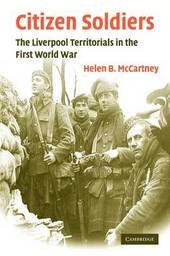
|
Citizen Soldiers: The Liverpool Territorials in the First World War
Paperback / softback
Main Details
| Title |
Citizen Soldiers: The Liverpool Territorials in the First World War
|
| Authors and Contributors |
By (author) Helen B. McCartney
|
| Series | Studies in the Social and Cultural History of Modern Warfare |
|---|
| Physical Properties |
| Format:Paperback / softback | | Pages:294 | | Dimensions(mm): Height 229,Width 152 |
|
| Category/Genre | British and Irish History
First world war |
|---|
| ISBN/Barcode |
9780521187770
|
| Classifications | Dewey:940.48141 |
|---|
| Audience | | Professional & Vocational | | General | |
|---|
| Illustrations |
Worked examples or Exercises
|
|
Publishing Details |
| Publisher |
Cambridge University Press
|
| Imprint |
Cambridge University Press
|
| Publication Date |
3 March 2011 |
| Publication Country |
United Kingdom
|
Description
The popular image of the British soldier in the First World War is of a passive victim, caught up in events beyond his control, and isolated from civilian society. This book offers a different vision of the soldier's experience of war. Using letters and official sources relating to Liverpool units, Helen McCartney shows how ordinary men were able to retain their civilian outlook and use it to influence their experience in the trenches. These citizen soldiers came to rely on local, civilian loyalties and strong links with home to bolster their morale, whilst their civilian backgrounds helped them challenge those in command if they felt they were being treated unfairly. The book examines the soldier not only in his military context but in terms of his social and cultural life. It will appeal to anyone wishing to understand how the British soldier thought and behaved during the First World War.
ReviewsReview of the hardback: '... is of much more than local interest.' Times Literary Supplement Review of the hardback: '... excellent ... an exemplary blending of social and military history ... this is important, 'cutting edge' history.' Military Illustrated Review of the hardback: '... not short of historiographical ambition ... On the war itself, McCartney appears exemplary in her range of reference and close historiographical engagement ...' Northern History Review of the hardback: 'This is not just another rehash of the exploits of the dehumanised, oppressed, passive British Tommy slogging through the mud of Flanders, that field, like the trenches, is full almost to overcrowding. Instead McCartney considers how the ordinary men involved retained their civilian outlook, their local connections, their social status throughout those terrible years and, in the vast majority of cases, if they were lucky enough to escape unscathed, picked up the threads of their pre-war life ... Helen B. McCartney has produced a first class work using not only official sources, as would be expected, but also the letters and diaries of the men involved ... The book benefits from page by page footnotes and comprehensive bibliography, whilst the photographs, tables and maps only add to our pleasure and understanding. ...For anyone wishing to study the social and cultural history of the British soldier in the first World War this book opens up a new dimension in our understanding and is required reading, chapter 9 The Aftermath of War especially so.' Open History: The Journal of the Open University History Society Review of the hardback: 'Citizen Soldiers is one of the rare publications to breach this divide, combining detailed knowledge of military organization and structure with a careful consideration of the impact of the war on society and class and regional identity ... It is ... the job of good historical studies to ask as many questions as they answer. McCartney's careful, detailed and fascinating study of the experiences and identities of the Liverpool battalions in the war years deserves to be accompanied by further regional studies, in order that we may build a more detailed understanding of the lives of those who experienced the Great War.' Reviews in History Review of the hardback: ' ... this is a subject which deserves a wider readership and Citizen Soldiers is an excellent start; may it inspire urban and local historians to re-examine the relationship between the city and its citizens ...' Urban History
|